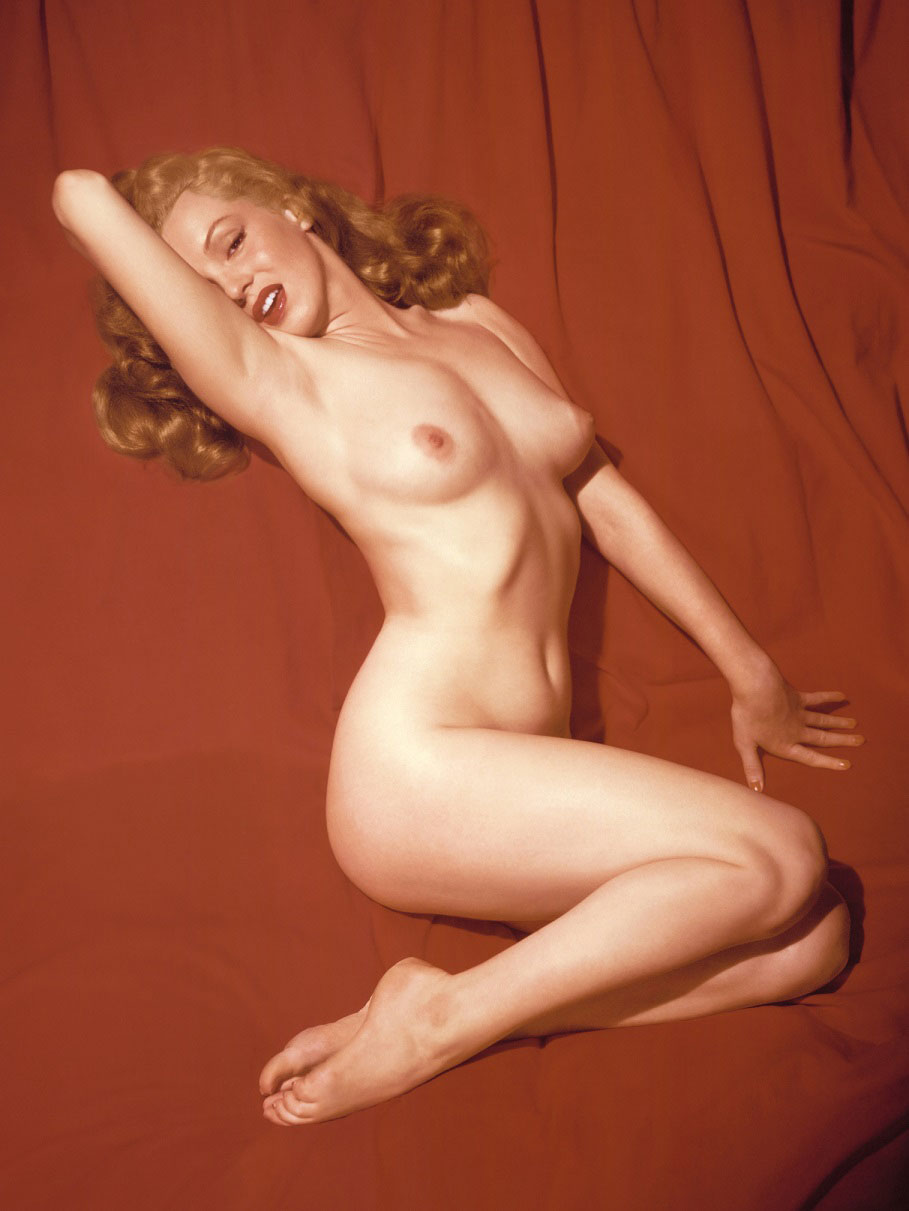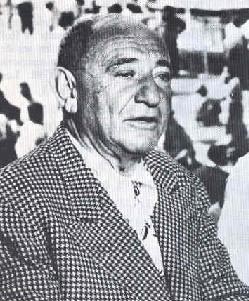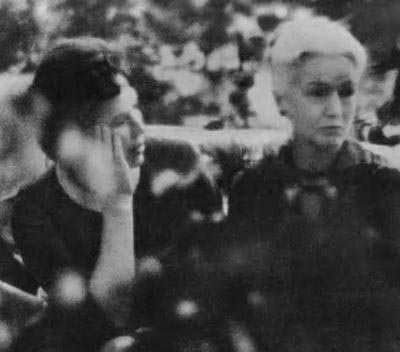Episode 1 continued: Marilyn’s starlet years
Links are here!
Part 1
Part 2
Part 3
In the last post, we ended on Marilyn’s marriage to her
first husband Jim Dougherty, as well as the beginning of her decorated modeling
career. Now we are moving on to her years as an ambitious starlet in Hollywood.
At this point in the movie,we see Jim and Norma Jeane
visiting Gladys at a mental institution.
 |
| From "The Secret Life of Marilyn Monroe" |
 |
| Side by side comparison of Marilyn with Stanley Gifford |
“I never called myself Mortenson at any time because Mr.
Mortenson was not my father. He proved that to the satisfaction of the authorities,
and for that reason, he had no financial responsibility for me.” -Marilyn to Hedda Hopper in 1953
Kelli as Marilyn mentions that she “drove out to the desert
to see him,” meaning her father. The only thing we really know about Marilyn’s
contact with her father is that in February of 1943, she wrote to Grace McKee
telling her of her plans to contact Gifford. Jim recalls a time when she
attempted to call her father, but he hung up on her. Both Natasha Lytess and
Sidney Skolsky claim that they did drive out to the desert to see him, and that
he wouldn’t answer her. And finally, rumor has it that in 1960 he finally made
the effort to get a hold of her over the phone, but she told him to talk to her
attorney. We can’t be sure of very much, it’s possible she drove out there,
it’s possible she attempted to phone him a few times in the early 40’s, but
there is nothing to really substantiate all of this. It’s safe to say that in
any event, Marilyn did not have any relationship with her father. There are also
no accounts that suggest Gladys did not remember giving birth to her daughter.
Gladys was very emotionally distant as a mother, she suffered the rest of her
life with schizophrenia, but she always knew who her daughter was.
At this point in the movie, a shy but determined Kelli as
Marilyn slowly walks into a makeup room where a man is working. She asks him if
he can give her some tips. The man agrees to help her out, and gives her a full
face of makeup, deciding which techniques would be best for her and educating
her on the ways she can improve her makeup for film. This man is Allan ‘Whitey’
Snyder, who will become a life-long friend and confidante until Marilyn’s death.
He will even have the emotionally brutal task of applying her makeup for her
funeral, as requested by Marilyn herself in conversation once. Whitey first did
Marilyn’s makeup for her very first screen test at 20th Century Fox
in 1945. He continued to work with her on Gentlemen Prefer Blondes, the Jack
Benny Show, How To Marry A Millionaire, Niagara, River of No Return, There’s No
Business Like Show Business, The Seven Year Itch, Bus Stop, Some Like It Hot,
Let’s Make Love, The Misfits, and Something’s Got To Give. He was even one of
her casket pallbearers.
 |
| From "The Secret Life of Marilyn Monroe" |
 |
| Marilyn with Whitey Snyder, 1953. |
Now we see Kelli as Marilyn phoning and old acquaintance:
photographer Tom Kelley. Not long before, Marilyn had a small collision with
another car on Sunset Boulevard. She was on her way to an audition and thought
she would never be able to make it, and couldn’t afford a taxi. Tom Kelley
rushed over and they talked for a moment. He gave her his card as well as money
for a cab. Now, Marilyn was phoning him granting his offer to pose nude. She
didn’t have any money at this point, and she needed it to pay her rent at the
Studio Club. She decided that she may as well go ahead and earn some money by
posing for him, although throughout her modeling career she was against posing
nude (although Andre de Dienes had asked her to many times, she politely turned
him down). After all, she was an unknown actress, so no one would recognize
her, right? And so in May of 1949, something legendary happened. Tom Kelley,
with his wife Natalie present, snapped some of the most well-known photos in
pop culture history: the famous red velvet nudes. Kelli Garner provides an
absolutely beautiful recreation of this moment in history, with her hair and
makeup done exactly as Norma Jeane’s in real life. Once the session was over,
Marilyn was paid $50, and was on her way. The Baumgarth calendar company then
bought Kelley’s photos for $500, which were then purchased by Hugh Hefner, who
used them as his centerfold in his first issue of Playboy in 1953.
 |
| From "The Secret Life of Marilyn Monroe" |
 |
| Marilyn Monroe, 1949. |
At the end of this scene, Kelley recommends that Marilyn go to one of Joe Schenck’s parties. Joseph Schenck was one of the biggest names in Hollywood at the time. He was the head of production at 20th Century Fox studios. He often threw parties at his home for celebrities in which lesser known starlets would attend to do specific jobs like, serving food or just being on display for the male guests and watching them play poker. In 1948, John Carroll, husband of Lucille Ryman, introduced Marilyn to a man named Pat de Cicco who was friends with Schenck. (Marilyn had rented out one of the Carrolls’ apartments, and they were financially helping her for a time). Pat was the one who suggested Marilyn go to one of Schenck’s parties. As a side note, Marilyn also met future confidante there, Louella Parsons.
Schenck, 76 at the time, took a liking to Marilyn. However,
the film depicts an event entirely opposite from the way it went down in real
life. In the movie, Schenck immediately falls in lust with Kelli as Marilyn, and
convinces her to go to bed with him. Afterwards, Schenck, played by Peter
MacNeill, is seen making an important phone call in which he lands Marilyn a
role in the film “Scudda Hoo! Scudda Hay!” He offers Kelli as Marilyn cash for
her services, but she politely declines, and is on her way. Here is what really
happened: Taking de Cicco’s advice, Marilyn showed up at one of Schenck’s poker
parties in 1948 as a young and unknown starlet. By this time, she had appeared
in a few uncredited roles under her contract for 20th, but they had
chosen not to renew it, so she was dropped. Marilyn meets Schenck at this party,
and he takes an immediate liking to her. The two become friends and she often
visits him at his home for dinner. It was Schenck’s influence that got Harry
Cohn to consider her for “Ladies of the Chorus” at Columbia studios. And here’s
the most important part: they did not have
a sexual relationship. Both firmly denied being involved other than just being
good friends. I don’t think the mixed up chronology in the film was that
intentional, it was probably just done that way to progress the movie more
smoothly. To conclude, meeting Schenck and attending his party happened before
Marilyn posed for Tom Kelley.
“Get this straight, Mr. Schenck and I were good friends. He
gave me encouragement when I needed it. He didn’t do anything for me. He let
Mr. Zanuck run the studio the way Mr. Zanuck wanted to run it. The only favor I
ever asked him, Mr. Schenck, was later, when I was back at Twentieth I wanted a
decent dressing room. I never asked him to help me get good parts at Twentieth,
and he didn’t. He knew how I felt about it, that I wanted to succeed on my
talent, not any other way, and he respected my feelings.” -Marilyn Monroe, Empire News June 1954
“She used to come here quite often for dinner. I think she
liked to eat. We have good food here. No, I never had any romantic thoughts
about Marilyn and she never had any such thoughts about me.” –Joseph Schenck,
Cavalier August 1961
 |
| Joe Schenck |
Lastly, here in the film we see Kelli as Marilyn at the
mental institution where her mother is being kept. This institution is supposed
to represent Agnew, the place she was admitted to after an attempt to escape
from Norwalk. In the scene, Marilyn is signing for her to be released, which is
a little confusing since if they are corresponding it with the year Marilyn
posed for Tom Kelly, it would be 1949, By this time in real life, Gladys had
been released from Agnew a few years before and was living with her new
husband, John Stewart Eley, in Los Angeles.
 |
| Right: Marilyn's mother Gladys |
Thank you for taking the time to read all this, hope you
learned something out of it! Stay tuned for the next post, which will be
wrapping up the first episode of “Secret Life.”
© Ky Reynolds and fifthhelena.blogspot.com 2016 Unauthorized use and/or duplication of this material without express and written permission from this site's author and/or owner is strictly prohibited. Excerpts and links may be used, provided that full and clear credit is given to Ky Reynolds and fifthhelena.blogspot.com with appropriate and specific direction to the original content.
© Ky Reynolds and fifthhelena.blogspot.com 2016 Unauthorized use and/or duplication of this material without express and written permission from this site's author and/or owner is strictly prohibited. Excerpts and links may be used, provided that full and clear credit is given to Ky Reynolds and fifthhelena.blogspot.com with appropriate and specific direction to the original content.

This work is licensed under a Creative Commons Attribution-NonCommercial-NoDerivatives 4.0 International License.
